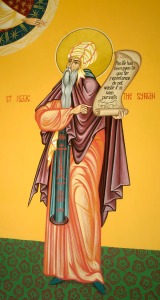On the subject of a discourse spoken by true knowledge*
Everything that can be perceived by the senses, whether an action or a word, is a manifestation of something hidden within, if the cause of the thing [perceived] is not accidental and the thing is a continual activity. A recompense is reckoned for the latter case, but the former is only slightly taken into account; that is to say, the strength or weakness of the will in the doing of evil or good deeds is not evidenced by anything that happens accidentally, but the proof of [the will’s] free choice is understood from [a thing’s] continued existence.
Sometimes power is given to an accidental occurrence so as even to defy the free will. Accidental occurrences, whether good or evil, befall a man as an incentive, or a trial, or for training, or as a recompense. The occurrence which is an incentive is good; the trial is considered evil [by men]; but the occurrences for training and for recompense are both [good and evil]. There are no chance occurrences, for nothing fortuitous happens to a man, whether good or evil. The will of God, which anticipates prayer, provides for every prayer, and by His wisdom He determines accordingly what is for our help. There is a Pilot Who steers the things of this world; and there is a guardian1 with each one of us, whose notice nothing escapes and who never weakens, but all occurrences are very carefully managed by this appointed guardian, and in these four kinds [of accidental occurrences] his management is active.
The prayer filled with sorrow, when a suitable manner of life is joined with prayerful sorrow, changes the character of occurrences and brings about improvement [in a man]. It strengthens and makes steadfast the good man, while to the evil man it gives a change to the opposite direction. Therefore do not doubt what I have said: there is no occurrence that is by chance and has no Pilot. If indeed prayer combined with integrity of life is able to alter or to restrain [occurrences], we should believe that every occurrence has a Pilot. Blessed is the man who compares every occurrence that befalls him with his own hidden state, who seeks out its cause and sees Him that governs it!
For him that would be wise towards God, there is no other way but to be a fool to the world and a hater of human glory. Astonishing is the son of man who by self-reproach conceals the greatness of his labor; at such a man the angels marvel. Let involuntary shortcomings be reckoned by you as the custodians of righteousness, for these are even found from time to time in vigilant men.
There is no prayer so quickly heard as the prayer whereby a man asks to be reconciled with those who are angry with him. For when he charges himself with the offense, this prayer is immediately answered.
If, although you do what is proper and are vigilant over your life, you see yourself as feeble and are despicable in your own eyes and hate the glory of men, then know that in very truth you walk on the path of God. But if you perceive in yourself that you are far from these things and, when you sound yourself out, you see that even imaginary thoughts of censure cause you pain, then know that you are devoid of the truth and are deceived by vainglory.
* This homily is found only in Syriac
1 i.e. the guardian angel

